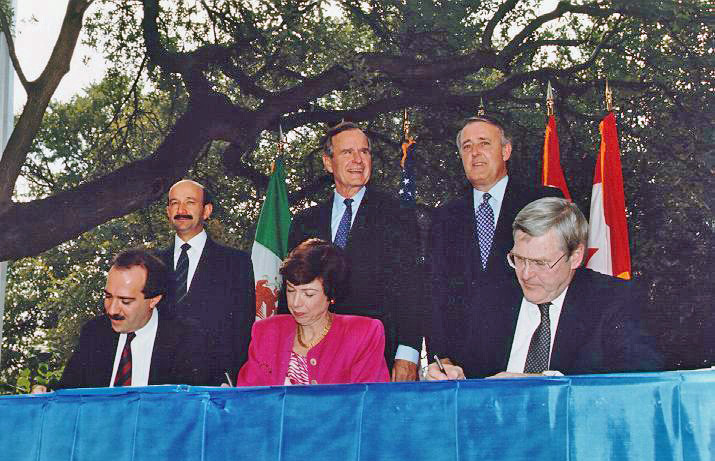The FTA, Not Such a Happy Story
Someday, someone will write the objective history of the US-Colombia free trade agreement For the US, the history is not a happy one.
A Daily Publication of The Dialogue
Q: U.S. Secretary of State John Kerry said recently that he is exploring the possibility of deepening the North American Free Trade Agreement, which celebrated its 20th anniversary on Jan. 1, to strengthen trade ties with Canada and Mexico with an eye toward expanding the agreement to include other countries in the hemisphere. How significant of a priority should strengthening NAFTA be as compared to other trade agreements, and would other countries be interested in participating? How would or should a re-launched NAFTA differ from the agreement reached two decades ago?
A: Arturo Sarukhán, chairman of global solutions at Podesta Group in Washington and former Mexican ambassador to the United States: "A decision by the Obama administration to fully and unreservedly embrace NAFTA and the trading success story it has fostered would certainly be welcome news. NAFTA can and should be deepened and upgraded. The way to do so, without opening Pandora's Box by seeking to renegotiate it, is via the Trans-Pacific Partnership. As free-trade agreements go, NAFTA was the keystone, a 1.0 version of how to facilitate trade. Subsequent trade deals were 2.0 agreements, and TPP now represents the 3.0 template for what free trade should aspire to achieve. Having Canada, the United States and Mexico adhere to the new, 21st century free and fair trading standards like those in TPP would not only modernize NAFTA's architecture by pulling it up by the bootstraps, it would help respond to a global economy very different from the one that existed in 1993, and also enhance North American integrated supply and production chains, one of the most salient success stories of our economic interaction. An expansion of NAFTA only makes sense if it's underpinned by acknowledging that regionalism is the name of the game in the hemisphere, and if it seeks to engage like-minded nations that believe in a rules-based international trading system. The Pacific Alliance, which is all about the nations that want in, and not about those nations that do not, could well serve as the core group with which to build a framework that allows those nations willing to engage to do so without being held back by others. Given asymmetries in approaches to free trade and subregional blocs with differing geopolitical and geoeconomic outlooks, aspiring to revive a Pan-American vision for trade is Panglossian at best, and will only lead to more impasse and frustration, as was the case with the FTAA in the early 1990s."
A: Carl Meacham, director of the Americas Program at the Center for Strategic and International Studies: "The leading economies in the Western Hemisphere are undergoing a series of fundamental changes that include sustained commercial success. This has led some governments to focus increasingly on enhancing commercial frameworks to maintain their international appeal. It comes as no surprise that U.S. policymakers would also consider this approach. NAFTA was a pioneer in this regard. For 20 years, NAFTA has contributed significantly to the economic development of North America. Since its inception in 1994, U.S. trade with Canada and Mexico has nearly quadrupled. The agreement was the first of its kind in the Western Hemisphere, and its scope has enabled a ballooning of trade in agricultural products, services, and manufactured goods--not to mention millions of jobs in the United States alone. It seems high time to consider how NAFTA might adjust to shifts within the region to best serve the United States and North America, within a competitive commercial global environment. With issues of wage disparity and labor standards continuing to drive illegal immigration to the United States from Mexico and a changing environment for free trade in the hemisphere, NAFTA must adapt should it hope to improve upon its success. The current climate in the hemisphere is more favorable for free trade than at any time in the recent past. The TTIP, TPP and Pacific Alliance are making headlines as innovative and forward-thinking trade agreements. In this context, reforms within NAFTA--especially regarding the development of a regional energy agreement--would be significant, but not enough to boost the agreement's commercial impact around the globe. What will serve NAFTA best is for its member nations to have the option to be treated collectively in their international commercial interactions, especially when such treatment is in their interests. This will ensure NAFTA's competitiveness in the context of our increasingly competitive and dynamic world."
A: Jeff Faux, distinguished fellow at the Economic Policy Institute in Washington: "NAFTA should not be extended; it should be re-negotiated. When urging the U.S. Congress to approve NAFTA, Bill Clinton promised that the deal would bring 'good-paying American jobs,' a rising trade surplus with Mexico and a dramatic reduction in illegal immigration. Instead, NAFTA has directly cost the United States a net loss of 700,000 jobs. The surplus with Mexico became a chronic deficit. And several million Mexican workers were driven out of agriculture and small business, increasing the flow of undocumented workers into the United States. The issue here is not whether or not nations should trade. It is an issue of who benefits from the rules. NAFTA was a deal among the financial elites of all three nations, leaving ordinary workers and citizens out. For example, the agreement grants extraordinary legal protections to corporations and guarantees capital mobility while denying workers and citizens the legal status and political power needed to defend themselves in these new cross-border jurisdictions. NAFTA's major effect was not so much to free trade as much as it was to free multinational investors from national labor, environmental and other regulatory constraints. The result has been a trade regime that makes suppressing wages the chief source of corporate profits. Thus, despite two decades of wage stagnation in the United States, the gap between U.S. and Mexican wages is about where it was when NAFTA began. We don't need 'more NAFTA.' We need a new agreement that re-establishes the balance between labor and capital in what is now a continental economy."
A: Ben Beachy, research director at Public Citizen's Global Trade Watch: "Given NAFTA's two-decade legacy of net damage-mass agricultural displacement and job loss, falling real wages, growing income inequality and an undermining of environmental and health safeguards-NAFTA should be renegotiated, not deepened or expanded through the controversial Trans-Pacific Partnership (TPP). In Mexico, a NAFTA-enabled influx of subsidized U.S. corn contributed to the destruction of livelihoods for about 2.5 million Mexican campesinos and agriculture-dependent workers. The promised increase in maquila jobs evaporated as hundreds of factories were undercut by Chinese sweatshop exports after China joined the World Trade Organization. The ensuing migration of displaced Mexican farmers and workers pushed down Mexican wages and contributed to a post-NAFTA doubling of Mexican immigration to the United States. Real wages in Mexico have fallen significantly below pre-NAFTA levels as price increases for basic consumer goods have exceeded wage increases-a minimum wage earner in Mexico today can buy 38 percent fewer consumer goods as on the day that NAFTA took effect. In the United States, NAFTA contributed to the loss of millions of decently paid manufacturing jobs, exacerbating middle-class wage stagnation and record growth in income inequality. Meanwhile, foreign corporations have used NAFTA's controversial 'investor-state' privileges to challenge scores of environmental and health laws in all three NAFTA countries. Foreign corporations have extracted more than $360 million from NAFTA governments via tribunal rulings against toxics bans, land-use rules, and water and forestry policies, while more than $12.4 billion remains pending. NAFTA's two decades of tumult and hardship for millions of North Americans now offers one of the most compelling arguments against expanding the NAFTA model via the TPP."
A: James R. Jones, member of the Advisor board and co-chair of Manatt Jones Global Strategies: "The place to strengthen and modernize NAFTA is through the negotiations of the Trans-Pacific Partnership. The TPP, hopefully, is nearing the end of negotiations and may be presented to the Congress for approval in 2014. Clearly, NAFTA needs modernizing. Much has happened in commerce and technology in the 20 years since NAFTA went into effect. There was no public Internet then, and so many other innovations developed that have changed the process of global trade. So our first priority should be to make Canada, Mexico and the United States a seamless, efficient economy and marketplace. That can be done through TPP and through harmonizing regulations and procedures and modernizing port infrastructure. Then we can invite other countries in the hemisphere to join us under modern rules of competition and fair play."
Someday, someone will write the objective history of the US-Colombia free trade agreement For the US, the history is not a happy one.
Over the last two decades, Brazil’s trade policy has centered on two main negotiations. Progress on both fronts, however, has been limited.
How will the change affect the countries’ trade relationship? What will be the economic impact in the United States and Mexico?
 US Government Photo
US Government Photo

